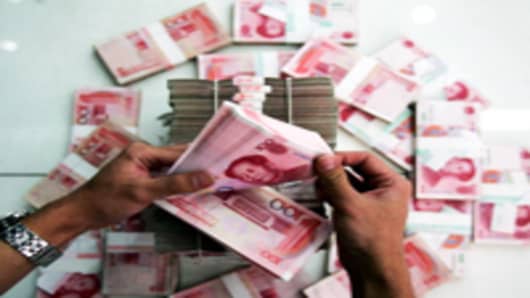A widening of the Chinese yuan's trading band could be imminent judging by the latest comments from the country's central bank, but analysts add one important caveat: don't expect any change to bring a significant strengthening of the currency.
The yuan's trading band against the U.S. dollar will be widened "in the near future," Yi Gang, deputy governor at China's central bank,the People's Bank of China, said at a meeting of the International Monetary Fund (IMF) in Washington on Wednesday, according to media reports.
(Read More: IMF Cuts World Growth Forecast)
"There's no smoke without fire, so maybe we can expect an announcement on the yuan in conjunction with the meetings," said Ray Attrill, co-head of foreign-exchange strategy at National Australia Bank in Sydney, referring to meetings of Group of 20 nations taking place in Washington this week.
"The practical implications of a band widening are limited and it would be wrong to jump to the conclusion that dollar/yuan will be allowed to fall faster than it has been in the sense that the moves we have seen have been well within the existing band," he added.
The yuan is currently allowed to rise or fall by 1 percent in either direction from a level fixed against the dollar each day by the country's central bank. The band was last widened a year ago.
Steps to liberalize trade in the yuan have in the past fueled expectations that China will allow the pace of the yuan's appreciation to pick up speed. Beijing has faced pressure from its trading partners to free up trade in the yuan, having been criticized for keeping its currency artificially low to make Chinese exports more attractive.
"I think the intent is to continue on the path we have seen with a controlled strengthening of the yuan maybe at a little bit of a slower pace," Jesper Bargmann, head of currencies, Asia-Pacific , at Royal Bank of Scotland, told CNBC's "Asia Squawk Box" on Friday.
"There has been talk of a widening of the band and that would be a step in the direction that the rest of the world has previously put a lot of pressure on China to do," he added.
(Read More: Yuan as a World Currency? Getting There Fast)



